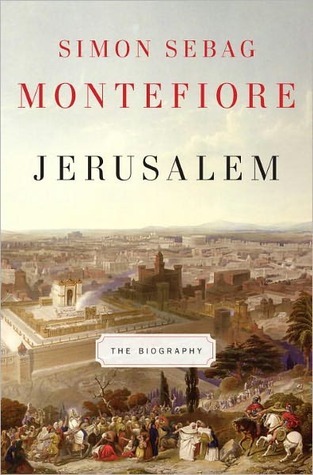More on this book
Community
Kindle Notes & Highlights
It is impossible to write a history of this city without acknowledging that Jerusalem is also a theme, a fulcrum, a spine even, of world history.
The contrast between the real and heavenly cities is so excruciating that a hundred patients a year are committed to the city’s asylum, suffering from the Jerusalem Syndrome, a madness of anticipation, disappointment and delusion.
There were certainly messianic rumours afoot and Herod would have feared a Davidian pretender, but there is no evidence that the king ever heard of Jesus or massacred any innocents. It is ironic that this monster should be particularly remembered for the one crime he neglected to commit.
Archelaus turned out to be so vicious, inept and extravagant that, after ten years, Augustus deposed him, exiling him to Gaul. Judaea became a Roman province, and Jerusalem was ruled from Caesarea on the coast by a series of low-ranking prefects; it was now that the Romans held a census to register taxpayers. This submission to Roman power was humiliating enough to provoke a minor Jewish rebellion and was the census recalled by Luke, probably wrongly, as the reason that Jesus’ family came to Bethlehem.
It is likely that the present Church of the Holy Sepulchre, which encloses both the place of crucifixion and the tomb, is the genuine site since its tradition was kept alive by local Christians for the next three centuries.
that crusading was just an opportunity for enrichment with sadistic dividends, is wrong. A handful of princes created new fiefdoms and a few Crusaders made their careers, whereas the costs were punishing and many lives and fortunes were lost in this quixotic and risky but pious enterprise. A spirit was abroad that is hard for modern people to grasp: Christians were being offered the opportunity to earn the forgiveness of all sins. In short, these warrior-pilgrims were overwhelmingly believers seeking salvation on the battlements of Jerusalem.
Later, Muslim historians claimed 70,000 or even 100,000 were killed, but the latest research suggests that the massacre was smaller, perhaps around 10,000, considerably less than the future Muslim massacres of Edessa and Acre. The best-placed contemporary, Ibn al-Arabi, who had recently lived in Jerusalem and was in Egypt in 1099, cited 3,000 as killed in al-Aqsa. Nor were all the Jews killed. There were certainly Jews and Muslims left alive. Unusually, it seems that the Crusader chroniclers, for propaganda and religious purposes, hugely exaggerated the scale of their own crimes. Such was holy
...more
A Genoese inn-keeper’s son, this magnetic and obsessional maverick had for years been soliciting their backing for a voyage across the Atlantic to reach India and China. If one of his dreams was this passage westwards to the Indies, the other was the liberation of Jerusalem from the east: from the start he linked the two. ‘I protested to Your Highnesses that everything gained as a result of this voyage would he spent in the conquest of Jerusalem and Your Highnesses laughed and said the idea pleased them.’
Now, in the most searing Jewish trauma between the fall of the Temple and the Final Solution, these Sephardic Jews (Sepharad being Hebrew for Spain) fled eastwards to the more tolerant Holland, Poland-Lithuania and the Ottoman empire where they were welcomed by Suleiman, both to boost his economy and to expose how Christianity had denied its Jewish heritage.
The first governor of the Massachusetts Bay Colony, John Winthrop, believed ‘the God of Israel is amongst us’ and paraphrased Jeremiah and Matthew to hail his settlement as ‘a city on a hill’ – America as the new Jerusalem. Soon there would be eighteen Jordans, twelve Canaans, thirty-five Bethels and sixty-six Jerusalems or Salems.
The Franciscans soon got it back again, but three times actual fighting broke out in the Church.* The daily battle of the Sepulchre was conducted more by sweeping than stabbing, more by broom than by bludgeon: whoever cleaned a part of the Church could claim it. Inch by inch, the sacristans, brooms in hand, tried to advance their territories, watched by their vigilant rival sacred sweepers.


